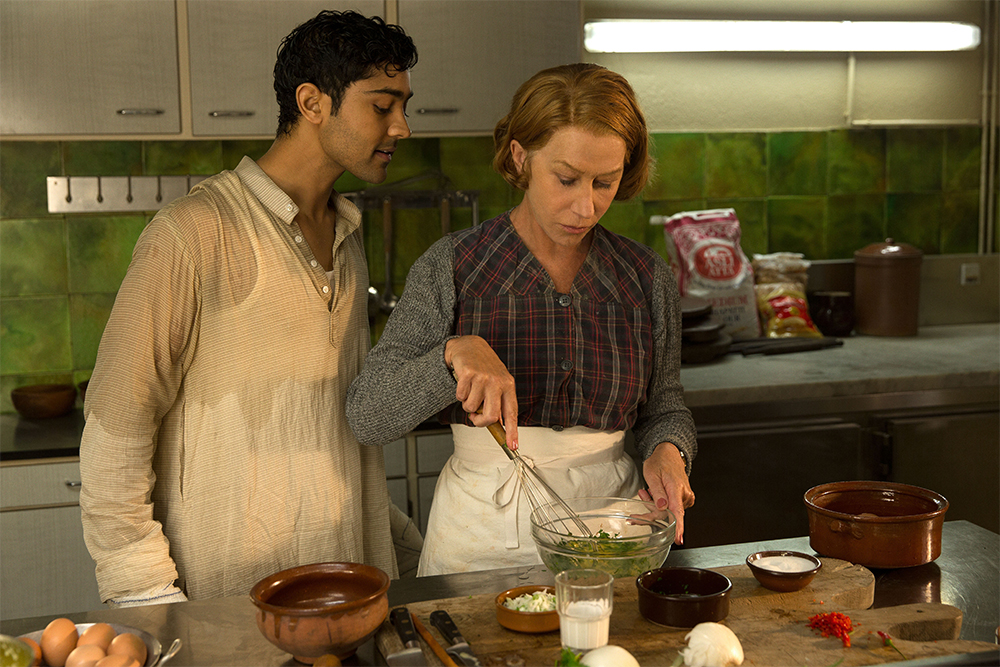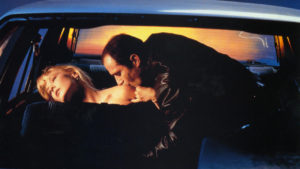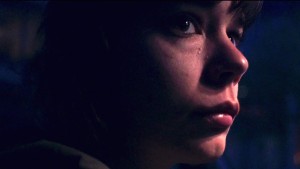
It’s tough to describe the feeling of dread that washes over you as you realize that you’re trapped among a ton of people enjoying a movie that you can’t stand. In the case of The Hundred-Foot Journey, a film that doesn’t even poorly attempt to keep you entertained, it’s the worst experience you can imagine. To think a movie with a handsome lead actor, a love interest who looks like the love child of Juliette Binoche and Rose Byrne. and Helen Mirren of all people, could still end in something this aggravating is astounding. With the poster prominently featuring a white sort-of-antagonist more than its Indian protagonist already making me wary, I walked in expecting something vaguely indulgent in stereotypes that would prove a mediocre experience à la The Best Exotic Marigold Hotel. What I got was a completely different story.
It all begins with an innocent-enough looking movie about an Indian family losing their restaurant and traversing Europe to relocate. This is, of course, an oversimplified description of Journey, but the film glosses over any additional details just as quickly, so they’re of little import. Turns out they find an empty lot across from a Michelin-starred restaurant owned by Madame Mallory (Mirren) that they choose to buy and proceed to restore into their own joint. That restaurant is named Maison Mumbai. What ensues is over an hour worth of awkward “I’m better than you” interactions between Mallory and the father of the family (Om Puri). The conflicts between families take up the first hour or so (likely more) of the film. If they were mildly entertaining, they could be excused. They’re not. They steal menus, steal food items, steal customers, and… that’s about it until things get drastic. Meanwhile, the film’s protagonist, Hassan (Manish Dayal), is busy becoming the best cook in all of Europe. By the time you realize exactly what the title is referring to, you’ll think the film is over. It’s not, and considering every false ending that Peter Jackson didn’t manage to sneak into The Return of the King shows up here, you’ll wish it did.
The first question we need to ask here is: when did Lasse Hallström stop making good films? That’s an unanswerable question (although I’m sure most of us would agree Chocolat was his last great one), but it’s not like his talent doesn’t occasionally shine through the mess he’s made. There are a couple of nice shots spread thinly over the running length; the two most memorable being one of Helen Mirren’s back as she tastes one of Hassan’s omelette’s for the first time and a long take throughout the entire restaurant as it’s being built from the ground up. But those shots are few, and the film often becomes overly reliant on montages to pass the time quickly, as though its two-hour length wasn’t nearly enough to depict an ounce of character development. There’s one for food preparation, there’s another for food training, another for food preparation, and, worst of all, one for Hassan’s slow descent into becoming a [gasp] popular, soulless chef. Mon dieu!
For the most part though, all that really happens with the camera to intensify the situations is an abundance of close-ups of food. One can only see the tedious task of cooking in close-up on screen so many times before being put to sleep, even though it’s a film that heavily deals with food. But a director can only do so much with a bad script, which brings up the next question: what was Steven Knight thinking when he picked up this project? This is the man who has written works like Eastern Promises, Dirty Pretty Things, Redemption, and even Locke, which manages to intrigue even though it’s comprised of one man sitting in a car for the entirety of the film. The dialogue is every kind of cliché (“I thought you might like to dance with your almost girlfriend”), the situations are often recycled from other works and sometimes just plain ridiculous (Helen Mirren sneaking around in a hoodie with a digital camera to take pictures of chickens), and the characters are so shoddily scripted that it’s a real wonder how anyone could consider it “feel-good” at all.
But if there’s any part of the film that really causes anger to rise in my soul, it’s the romantic subplots. Yes, that’s right: subplots. One between the young, one between the old, both incredibly juvenile and laughable to watch unfold. Hassan’s love interest (because that’s all she really is) is Marguerite (Charlotte Le Bon), who exists solely to be a lesser cook than Hassan, to be the voice he hears in his head while he reads a cookbook, and to fawn over him when he’s off becoming an even better chef. If that sounds awful, it only becomes worse as Mirren spends her time thinking about her love interest’s son as he’s off cooking, with both women shown to be doing nothing but reading his food reviews while he’s away. If that narrative doesn’t do it for you, there’s the option of watching the most predictable love story between Mirren and Puri’s curmudgeonly old folks happen.
There’s this one line in the film that goes, “Why change a recipe that’s two-hundred years old?” The answer, they say, is that “maybe two-hundred years is long enough.” Unfortunately for The Hundred-Foot Journey, it’s still stuck two-hundred years in the past; if not far longer. For a work of art that speaks mountains of how much soul is necessary to make food, it’s one that lacks any real soul at all. It plays everything by the books and never takes a single risk. It’s a film with no flavor whatsoever, leaving you with nothing to savor once the credits roll and you’re itching to run out. The restaurant in the film might have had a Michelin star or three, but Hallström’s film, unfortunately, wouldn’t manage to score even half a star on Yelp if possible.
—
The Hundred-Foot Journey opens in theaters on August 8th.
Directed by Lasse Hallström; written by Steven Knight; based on a novel by Richard C. Morais; starring Manish Dayal, Om Puri, Helen Mirren, and Charlotte Le Bon; 122 minutes.



 Derek
Derek
 Isabelle
Isabelle